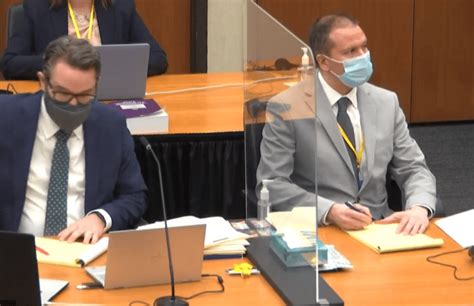
Retired Judge Peter Cahill, who presided over the high-profile trial of Derek Chauvin for the murder of George Floyd, has broken his silence, describing the experience as a “career highlight” despite the immense pressure and scrutiny surrounding the case.
Retired Judge Peter Cahill, who oversaw the trial of Derek Chauvin for the murder of George Floyd, has publicly stated that presiding over the landmark case was a “career highlight,” acknowledging the intense pressure and global attention the trial garnered. In a recent interview, Cahill reflected on the complexities of the trial, the legal challenges, and the weight of responsibility he felt in ensuring a fair process.
Cahill, who retired from the bench in May, emphasized the significance of the case within his long and distinguished career as a judge. “It was a career highlight,” he stated, recognizing the trial’s profound impact on the legal system and the broader national conversation on race and justice. The Chauvin trial, which concluded in April 2021 with Chauvin’s conviction on all counts, was one of the most closely watched legal proceedings in recent history, sparking widespread debate and activism.
The judge’s remarks offer a rare glimpse into the perspective of the individual tasked with maintaining order and impartiality in a highly charged courtroom. Cahill’s role demanded not only a deep understanding of the law but also the ability to navigate the intense emotions and public expectations surrounding the case.
The trial was marked by numerous challenges, including pre-trial publicity, jury selection complexities, and the need to balance the rights of the defendant with the overwhelming public interest in justice for George Floyd. Cahill consistently emphasized the importance of due process and the need to ensure that Chauvin received a fair trial, regardless of the circumstances.
Cahill’s assessment of the trial as a “career highlight” underscores the unique role that judges play in upholding the rule of law, even in the most controversial and emotionally charged cases. His comments provide valuable insight into the pressures and responsibilities faced by judges in high-profile trials, where the stakes are exceptionally high, and the world is watching.
The Derek Chauvin trial stemmed from the death of George Floyd on May 25, 2020, in Minneapolis, Minnesota. Floyd, a 46-year-old Black man, died after Chauvin, a White police officer, knelt on his neck for approximately nine minutes and twenty-nine seconds. The incident, captured on video by bystanders, sparked protests and outrage across the United States and around the world, igniting a renewed focus on issues of racial injustice and police brutality.
Chauvin was subsequently charged with second-degree unintentional murder, third-degree murder, and second-degree manslaughter. The trial began on March 29, 2021, and lasted for several weeks, with the prosecution presenting evidence and testimony to demonstrate Chauvin’s culpability in Floyd’s death. The defense argued that Chauvin’s actions were justified under the circumstances and that Floyd’s pre-existing health conditions and drug use contributed to his death.
The trial was held in Hennepin County District Court in Minneapolis, with Judge Cahill presiding over the proceedings. Cahill’s role was to ensure that the trial was conducted fairly and impartially, in accordance with the law. He was responsible for ruling on legal motions, overseeing the presentation of evidence, instructing the jury, and maintaining order in the courtroom.
The selection of the jury was a crucial aspect of the trial, as the jurors were tasked with rendering a verdict based on the evidence presented. The jury selection process was lengthy and complex, with potential jurors being questioned extensively about their views on race, policing, and the events surrounding Floyd’s death. Ultimately, a jury of twelve individuals was selected, representing a diverse cross-section of the community.
Throughout the trial, Judge Cahill faced numerous challenges, including dealing with the intense media scrutiny, managing the emotional atmosphere in the courtroom, and addressing legal issues raised by both the prosecution and the defense. He consistently emphasized the importance of maintaining the integrity of the judicial process and ensuring that Chauvin received a fair trial.
One of the key legal issues in the trial was the cause of Floyd’s death. The prosecution presented expert medical testimony to argue that Floyd died as a result of Chauvin’s actions, while the defense argued that Floyd’s pre-existing health conditions and drug use contributed to his death. The jury was tasked with weighing the evidence and determining whether Chauvin’s actions were a substantial cause of Floyd’s death.
Another important aspect of the trial was the video footage of the incident, which showed Chauvin kneeling on Floyd’s neck for an extended period of time. The video was played repeatedly during the trial and was a key piece of evidence for the prosecution. The defense argued that the video did not provide a complete picture of the events and that Chauvin’s actions were justified under the circumstances.
After several weeks of testimony and evidence, the jury began deliberations on April 19, 2021. The deliberations lasted for several hours, and the jury ultimately reached a unanimous verdict, finding Chauvin guilty on all three counts. The verdict was met with widespread relief and celebration, but also with a recognition that the fight for racial justice was far from over.
Following the verdict, Chauvin was sentenced to 22.5 years in prison. He was also charged with federal civil rights violations in connection with Floyd’s death, and he pleaded guilty to those charges in December 2021.
Judge Cahill’s decision to speak publicly about the trial reflects the profound impact that the case had on him personally and professionally. His remarks provide valuable insight into the complexities of the legal process and the challenges faced by judges in high-profile cases.
“It was something that, looking back on my career, I would consider the highlight,” Cahill stated, acknowledging the weight of the responsibility he carried during the trial. He emphasized the importance of upholding the rule of law and ensuring that all defendants receive a fair trial, regardless of the circumstances.
Cahill also reflected on the importance of the jury system, noting that the jurors in the Chauvin trial took their responsibilities seriously and rendered a verdict based on the evidence presented. He praised the jurors for their diligence and their commitment to justice.
The Chauvin trial served as a reminder of the ongoing challenges facing the United States in addressing issues of racial injustice and police brutality. The trial sparked a national conversation about the need for police reform and for greater accountability for law enforcement officers.
In the aftermath of the trial, numerous states and cities have implemented new laws and policies aimed at addressing these issues. These include measures to improve police training, increase transparency, and hold officers accountable for misconduct.
The Chauvin trial also highlighted the importance of video evidence in holding law enforcement officers accountable for their actions. The video footage of Floyd’s death played a crucial role in the trial and helped to galvanize public opinion against police brutality.
As the nation continues to grapple with issues of racial injustice and police brutality, the Chauvin trial will continue to be remembered as a pivotal moment in American history. The trial served as a reminder of the importance of upholding the rule of law and ensuring that all individuals are treated equally under the law.
Judge Cahill’s remarks provide valuable insight into the complexities of the legal process and the challenges faced by judges in high-profile cases. His comments underscore the importance of maintaining the integrity of the judicial system and ensuring that all defendants receive a fair trial.
The Chauvin trial was a landmark case that had a profound impact on the legal system and the broader national conversation on race and justice. Judge Cahill’s role in the trial was crucial in ensuring that the proceedings were conducted fairly and impartially. His decision to speak publicly about the trial provides valuable insight into the challenges and responsibilities faced by judges in high-profile cases.
Cahill’s reflections also touch on the immense pressure that comes with overseeing such a significant trial. The eyes of the world were on the courtroom, and every decision he made was subject to intense scrutiny. He had to balance the rights of the defendant with the public’s demand for justice, all while ensuring that the trial remained fair and impartial.
The judge’s comments also highlight the importance of the jury system. The jurors in the Chauvin trial were tasked with a difficult and weighty responsibility, and they ultimately rendered a verdict that was based on the evidence presented. Cahill praised the jurors for their dedication and their commitment to justice.
The Chauvin trial was not just a legal proceeding; it was a cultural and social event that sparked a national conversation about race, policing, and justice. The trial served as a reminder of the deep-seated inequalities that exist in American society and the urgent need for reform.
In the wake of the trial, many states and cities have implemented new laws and policies aimed at addressing these issues. These reforms include measures to improve police training, increase transparency, and hold officers accountable for misconduct.
The Chauvin trial also underscored the importance of video evidence in holding law enforcement officers accountable for their actions. The video footage of George Floyd’s death was a key piece of evidence in the trial, and it helped to galvanize public opinion against police brutality.
As the nation continues to grapple with these complex issues, the Chauvin trial will continue to be remembered as a pivotal moment in American history. The trial served as a reminder of the importance of upholding the rule of law and ensuring that all individuals are treated equally under the law.
Judge Cahill’s willingness to speak publicly about the trial is a testament to his commitment to transparency and accountability. His remarks provide valuable insight into the inner workings of the legal system and the challenges faced by those who are tasked with administering justice.
The Chauvin trial was a unique and historic event, and Judge Cahill’s role in the trial was crucial in ensuring that the proceedings were conducted fairly and impartially. His decision to speak publicly about the trial provides valuable insight into the challenges and responsibilities faced by judges in high-profile cases.
The legacy of the Chauvin trial will continue to shape the national conversation about race, policing, and justice for years to come. The trial served as a reminder of the importance of upholding the rule of law and ensuring that all individuals are treated equally under the law.
Cahill’s statement, though brief, encapsulates the complexity and weight of the case. It acknowledges the significance of the trial in his professional journey while underscoring the broader implications for the legal system and society. It serves as a reminder of the importance of due process and the need for fair and impartial justice, even in the most emotionally charged circumstances. The judge’s reflections are a valuable contribution to the historical record of a trial that has had a lasting impact on the United States and the world.
The former judge’s perspective offers a rare glimpse behind the scenes of a trial that captivated global attention. The immense pressure, the legal intricacies, and the moral weight of the proceedings demanded a steady hand and unwavering commitment to justice. Cahill’s characterization of the trial as a “career highlight” is not merely a statement of personal achievement but also a reflection of the profound importance of the case in the ongoing struggle for equality and accountability.
Moreover, his comments shed light on the often-overlooked role of judges in shaping the course of justice. In high-profile cases, judges are not simply neutral arbiters; they are also responsible for managing the narrative, ensuring fairness, and upholding the integrity of the legal process. Cahill’s performance in the Chauvin trial was widely praised for its impartiality and judiciousness, and his reflections offer a valuable perspective on the challenges and rewards of serving in this crucial role.
The judge’s statement also serves as a reminder of the power of the legal system to address issues of social justice. While the Chauvin trial was not a panacea for all the problems of racial inequality and police brutality, it did represent a significant step forward in holding law enforcement officers accountable for their actions. The verdict in the case sent a clear message that such behavior would not be tolerated and that those who violate the public trust would be held responsible.
In conclusion, Judge Cahill’s remarks on the Chauvin trial provide a valuable perspective on the complexities of the legal process and the importance of upholding the rule of law. His characterization of the trial as a “career highlight” underscores the significance of the case in the ongoing struggle for equality and accountability. As the nation continues to grapple with issues of racial injustice and police brutality, the Chauvin trial will continue to be remembered as a pivotal moment in American history.
The trial’s outcome and the subsequent sentencing of Chauvin brought a sense of closure to the Floyd family and many in the community. However, it also highlighted the long road ahead in addressing systemic racism and reforming policing practices. The judge’s reflections serve as a reminder of the responsibility that rests on all members of society to work towards a more just and equitable future.
Cahill’s career highlight is not just about the trial itself but what it represents for the judiciary and the pursuit of justice. It shows the dedication needed to uphold the law and manage a case that carried significant social implications, leaving a legacy that will be studied for years. The case also tested the strength and resilience of the American justice system, and Cahill’s handling of the trial demonstrated the importance of an independent and impartial judiciary.
The trial and its aftermath have prompted numerous discussions and reforms aimed at improving police accountability and addressing racial bias in the criminal justice system. These efforts include measures to enhance police training, increase transparency in law enforcement practices, and promote community policing initiatives.
As the nation continues to grapple with these issues, the lessons learned from the Chauvin trial will remain relevant for years to come. The case serves as a reminder of the importance of vigilance in protecting civil rights and ensuring that all individuals are treated fairly under the law.
Judge Cahill’s recent comments provide a deeper understanding of the challenges and responsibilities faced by judges in high-profile cases. His reflections underscore the importance of maintaining the integrity of the judicial system and upholding the rule of law, even in the most emotionally charged circumstances. The Chauvin trial was a landmark event that had a profound impact on the legal system and the broader national conversation on race and justice. Cahill’s role in the trial was crucial in ensuring that the proceedings were conducted fairly and impartially.
The public scrutiny and intense media coverage surrounding the trial placed enormous pressure on everyone involved, from the judge and attorneys to the jurors and witnesses. Judge Cahill had to navigate this complex environment while ensuring that the trial remained fair and impartial. His ability to maintain order and decorum in the courtroom, even in the face of intense emotions, was a testament to his judicial temperament and his commitment to upholding the rule of law.
The Chauvin trial also highlighted the importance of the jury system. The jurors in the case were tasked with a difficult and weighty responsibility, and they ultimately rendered a verdict that was based on the evidence presented. Cahill praised the jurors for their dedication and their commitment to justice.
The trial was not just a legal proceeding; it was a cultural and social event that sparked a national conversation about race, policing, and justice. The trial served as a reminder of the deep-seated inequalities that exist in American society and the urgent need for reform.
Judge Cahill’s willingness to speak publicly about the trial is a testament to his commitment to transparency and accountability. His remarks provide valuable insight into the inner workings of the legal system and the challenges faced by those who are tasked with administering justice.
The Chauvin trial was a unique and historic event, and Judge Cahill’s role in the trial was crucial in ensuring that the proceedings were conducted fairly and impartially. His decision to speak publicly about the trial provides valuable insight into the challenges and responsibilities faced by judges in high-profile cases.
The legacy of the Chauvin trial will continue to shape the national conversation about race, policing, and justice for years to come. The trial served as a reminder of the importance of upholding the rule of law and ensuring that all individuals are treated equally under the law.
In the wake of the Chauvin trial, there have been numerous calls for police reform and greater accountability for law enforcement officers. Many states and cities have implemented new laws and policies aimed at addressing these issues. These reforms include measures to improve police training, increase transparency, and hold officers accountable for misconduct.
The Chauvin trial also underscored the importance of video evidence in holding law enforcement officers accountable for their actions. The video footage of George Floyd’s death was a key piece of evidence in the trial, and it helped to galvanize public opinion against police brutality.
As the nation continues to grapple with these complex issues, the Chauvin trial will continue to be remembered as a pivotal moment in American history. The trial served as a reminder of the importance of upholding the rule of law and ensuring that all individuals are treated equally under the law.
Judge Cahill’s remarks offer a rare glimpse into the mindset of a judge who presided over one of the most high-profile trials in recent history. His perspective provides valuable insight into the challenges and responsibilities faced by judges in such cases, and his comments underscore the importance of maintaining the integrity of the judicial system.
The Chauvin trial was a watershed moment in American history, and Judge Cahill’s role in the trial was crucial in ensuring that the proceedings were conducted fairly and impartially. His decision to speak publicly about the trial is a testament to his commitment to transparency and accountability.
The legacy of the Chauvin trial will continue to shape the national conversation about race, policing, and justice for years to come. The trial served as a reminder of the importance of upholding the rule of law and ensuring that all individuals are treated equally under the law.
The fact that Cahill views the Chauvin trial as a “career highlight” speaks volumes about the significance of the case and the weight of responsibility that he carried throughout the proceedings. Despite the immense pressure and scrutiny, he remained committed to upholding the principles of justice and ensuring that both sides had a fair opportunity to present their case.
His remarks also highlight the importance of an independent and impartial judiciary. In a highly polarized society, it is essential that judges are able to make decisions based on the law and the evidence, without regard to public opinion or political pressure. Judge Cahill demonstrated this independence throughout the Chauvin trial, and his actions serve as a model for other judges to follow.
The Chauvin trial was a complex and challenging case, but it also served as a reminder of the power of the legal system to address issues of social justice. While the trial did not solve all of the problems of racial inequality and police brutality, it did represent a significant step forward in holding law enforcement officers accountable for their actions.
Judge Cahill’s reflections on the Chauvin trial provide valuable insight into the workings of the American justice system and the challenges faced by those who are tasked with administering justice. His comments underscore the importance of upholding the rule of law and ensuring that all individuals are treated equally under the law.
Frequently Asked Questions (FAQ)
1. Why did Judge Cahill describe the Derek Chauvin trial as a “career highlight”?
Judge Cahill stated that presiding over the Derek Chauvin trial was a “career highlight” due to the trial’s significance and the challenges it presented. The case garnered immense public attention and scrutiny, placing significant pressure on the judge to ensure a fair and impartial legal process. The complexity of the legal issues, the emotional atmosphere surrounding the trial, and the importance of upholding the rule of law all contributed to Cahill’s assessment of the trial as a pivotal moment in his career. It demonstrated his commitment to justice and the law, even under intense pressure.
2. What were some of the major challenges Judge Cahill faced during the Chauvin trial?
Judge Cahill faced numerous challenges during the Chauvin trial, including:
- Intense Media Scrutiny: The trial was one of the most closely watched legal proceedings in recent history, with constant media coverage and analysis. This created a highly charged atmosphere and placed immense pressure on the judge to ensure fairness and impartiality.
- Jury Selection: Selecting an impartial jury was a complex and time-consuming process, as potential jurors had to be carefully screened for biases and preconceptions.
- Legal Issues: The trial involved a number of complex legal issues, including the cause of George Floyd’s death, the admissibility of evidence, and the appropriate jury instructions.
- Emotional Atmosphere: The trial was emotionally charged, with strong feelings on both sides of the issue. Judge Cahill had to maintain order and decorum in the courtroom while ensuring that all parties were treated with respect.
- Maintaining Impartiality: Cahill had to ensure Chauvin received a fair trial despite the public outcry over George Floyd’s death.
- Security Concerns: The trial presented significant security challenges, as there were concerns about potential protests and violence.
3. What impact did the Chauvin trial have on the national conversation about race and policing?
The Chauvin trial had a profound impact on the national conversation about race and policing. The video footage of George Floyd’s death sparked widespread outrage and protests, leading to renewed calls for police reform and greater accountability for law enforcement officers. The trial served as a reminder of the systemic inequalities that exist in American society and the urgent need for change. The verdict in the case, finding Chauvin guilty on all counts, was seen by many as a step towards justice, but also as a reminder that the fight for racial equality is far from over. It accelerated the discussion on police brutality and the need for systemic change, leading to legislative proposals and policy reforms at both the state and federal levels.
4. What reforms have been implemented in response to the Chauvin trial and the broader movement for police reform?
In the aftermath of the Chauvin trial and the broader movement for police reform, numerous reforms have been implemented at the state and local levels. These reforms include:
- Improved Police Training: Many states and cities have implemented new training programs for police officers, focusing on de-escalation techniques, implicit bias awareness, and crisis intervention.
- Increased Transparency: Some jurisdictions have increased transparency in law enforcement practices, such as by requiring body cameras and making police records more accessible to the public.
- Accountability Measures: There have been efforts to hold officers accountable for misconduct, such as through independent investigations, civilian review boards, and changes to qualified immunity laws.
- Community Policing: Some communities have adopted community policing strategies, which emphasize building relationships between police officers and the communities they serve.
- Changes in Use of Force Policies: Many police departments have revised their use of force policies to emphasize de-escalation and minimize the use of deadly force.
5. What is the significance of Judge Cahill’s decision to speak publicly about the Chauvin trial?
Judge Cahill’s decision to speak publicly about the Chauvin trial is significant because it provides a rare glimpse into the perspective of the individual who presided over one of the most high-profile legal proceedings in recent history. His remarks offer valuable insight into the challenges and responsibilities faced by judges in such cases, and his comments underscore the importance of maintaining the integrity of the judicial system. By sharing his experiences and reflections, Judge Cahill contributes to a better understanding of the legal process and the role of judges in upholding the rule of law. His comments highlight the human element of the justice system and how even judges are deeply affected by the cases they handle, particularly those with significant social and political implications. His transparency is beneficial for public trust in the judiciary.









